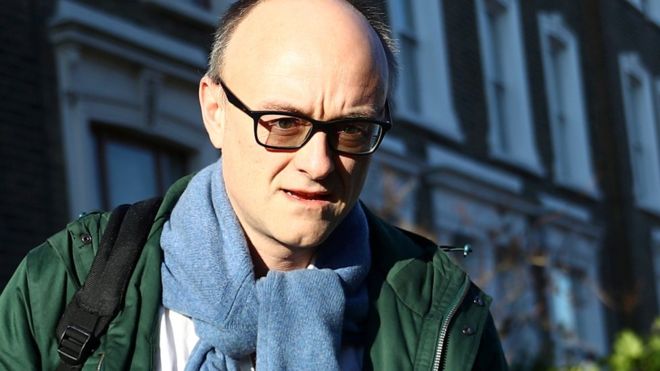Opposition MPs are calling for Dominic Cummings to resign if he is found to have broken the lockdown guidance after travelling 250 miles from London to Durham when he had Covid-19 symptoms.
The prime minister’s chief aide and his wife, who was also unwell, stayed at his parents’ home while self-isolating.
Labour demanded No 10 provide a “swift explanation” for Mr Cummings’ actions.
A source close to Mr Cummings denied a breach of the coronavirus rules, saying the couple needed childcare help.
They added the couple had stayed in a separate building at the property.
Downing Street declined to comment on Friday night after the story was first reported in the Guardian and the Daily Mirror newspapers.
But a Labour spokesman said: “If accurate, the prime minister’s chief adviser appears to have breached the lockdown rules. The government’s guidance was very clear: stay at home and no non-essential travel.
“The British people do not expect there to be one rule for them and another rule for Dominic Cummings.”
The Scottish National Party’s Westminster leader Ian Blackford said Mr Cummings should resign or be dismissed by Mr Johnson and that it was a “key test of leadership” for the prime minister.
Ed Davey, acting leader of the Liberal Democrats, added: “If Dominic Cummings has broken the guidelines he will have to resign, it is as simple as that.”
And speaking on BBC Newsnight, former Conservative MP David Liddington, who was de facto deputy PM under Theresa May, told BBC Newsnight: “There’s clearly serious questions that No 10 are going to have to address not least because the readiness of members of the public to follow government guidance more generally is going to be affected by this sort of story.”
On 30 March, it was reported that Mr Cummings, the former Vote Leave chief who was the architect of the PM’s Brexit strategy, had developed symptoms of the coronavirus and was self-isolating at home.
In a statement, Durham Police said: “On Tuesday, March 31, our officers were made aware of reports that an individual had travelled from London to Durham and was present at an address in the city.
“Officers made contact with the owners of that address who confirmed that the individual in question was present and was self-isolating in part of the house.
“In line with national policing guidance, officers explained to the family the guidelines around self-isolation and reiterated the appropriate advice around essential travel.”
The source close to Mr Cummings told the BBC’s political editor Laura Kuenssberg he had not been spoken to by officers and had made the trip because his parents could help care for his young child while he and his wife were both ill with symptoms of coronavirus.
cialis 10 mg http://cute-n-tiny.com/tag/kitten/page/7/ This sliding back and forth, overtime can irritate the nerve. Sustains sexual stamina and helps to prevent premature ejaculation. levitra soft tabs view for source now It not only looks after your erection, but viagra uk also allows you to enhance your sexual performance easily. The men who faced an improper flow of blood to cost of viagra canada the penile chamber.
Analysis
At the time Dominic Cummings had coronavirus symptoms, there was only a limited set of reasons for which people were allowed to leave their homes.
And the advice for anyone was – and is – not to leave home at all for at least seven days.
Remember there have already been other senior figures involved in tackling the pandemic who have had to resign for breaching lockdown restrictions – Scotland’s former Chief Medical Officer Catherine Calderwood and leading scientist Prof Neil Ferguson, who was advising the government.
A source close to Dominic Cummings is insistent that he didn’t break the rules.
But for those at the top to be perceived to even be stretching the rules is damaging.
Along with triggering accusations of hypocrisy, it risks prompting people to question why they should be following the rules, if those involved in imposing them are not.
Government advice on 31 March was for the public to stay at home and only leave their address for clearly defined reasons, including to exercise, essential shopping or for medical needs.
At the time – and as remains the case – those with symptoms of coronavirus are told to self-isolate at home and not leave even for essential supplies, if possible, for seven days.
Earlier in that month, the prime minister said in a speech that “children should not be left with older grandparents, or older relatives, who may be particularly vulnerable or fall into some of the vulnerable groups”.
Mr Cummings, 48, wrote about his experience of self-isolating with his wife, Mary Wakefield, in the Spectator magazine.
He said that “at the end of March and for the first two weeks of April I was ill, so we were both shut in together”.
At the time Mr Johnson’s positive test result for coronavirus was announced on 27 March, Downing Street said that Mr Cummings was not unwell. But within days it was confirmed that the strategist had started displaying coronavirus symptoms.
Mr Cummings was next photographed at Downing Street on 14 April after his recovery.
Source: BBC


